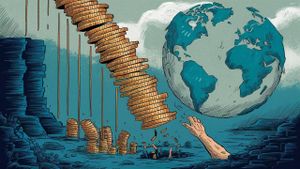Donald Trump has made quite the comeback, returning to Washington as President-elect after his recent victory over Vice President Kamala Harris. During his visit to the White House on November 13, 2024, Trump and President Joe Biden engaged in discussions about what is shaping up to be a rather significant transition of power. Their nearly two-hour meeting showcased both leaders shaking hands and expressing intentions for a smooth transfer, which contrasts sharply with the tumultuous handoff four years ago.
Upon entering the Oval Office, Trump and Biden sat down together with the crackling fire serving as a warm backdrop. With reporters present, the moment felt almost surreal—a former president now facing off against his successor with the air of civility. President Biden referred to Trump alternately as 'Mr. President-elect' and 'Donald,' highlighting their shifting dynamic from rivals to participants engaged in traditional protocols of power transfer.
Not one to miss out on his moment, Trump responded graciously to Biden, stating, 'Thank you very much,' and adding a note of political reflection: 'Politics is tough. And it’s, in many cases, not a very nice world. But it is a nice world today, and I appreciate it very much.' He emphasized his commitment to ensuring the transition would be smooth, thanking Biden for hosting him, which marked a significant pivot from their previous interactions.
This moment marks the culmination of Trump’s political resurgence—he exited Washington in January 2021 after orchestrated chaos at the Capitol, leading to remarkable backlash. Yet here he stands again, buoyed by what he terms as the mandate of governance bestowed upon him by voters. Media captures of the serene handshake spoke volumes, considering the more turbulent climate of Trump's last days as president.
Following their formal remarks, reporters tried to elicit responses from both men, to no avail, as the encounter concluded without any answers to shouted questions. Notably, Biden seemed at ease, which was starkly different from Trump’s first meeting with Barack Obama back when he stepped onto the national stage—an encounter where he appeared subdued and anxious.
After their business was concluded, Trump's departure was equally silent; he skipped interactions with waiting reporters. The meeting was not without its customary rituals, as both leaders brought their respective chiefs of staff, forming part of the traditions bounding the peaceful transition of power.
Before concluding the session, First Lady Jill Biden welcomed Trump, presenting him with a handwritten letter intended for Melania Trump. The personal touch extended from one First Lady to another was filled with goodwill, expressively stating they were ready to assist wherever necessary during the transition. Meanwhile, Trump was busy courting his supporters, sending out fundraising emails even as he sat across from Biden.
Trump’s visit was emblematic of his reestablished position, following years of uncertainty and debate surrounding his tactics and leadership style. The President-elect conveyed buoyant remarks to House Republicans, saying, 'It’s nice to win.' This victorious sentiment was reciprocated with standing ovations as he made light of the Republican successes across the ballot.
Despite the celebratory atmosphere, there is the undercurrent of Trump’s historic second run for presidency, something recorded back to Grover Cleveland who also held nonconsecutive terms. Trump is already hinting at potential future engagements, even saying humorously, 'I suspect I won’t be running again,' referencing constitutional limitations on presidential terms—though the laughter from the Republican lawmakers suggested optimism.
Critically, Trump's return to the political scene coincides with key congressional leadership elections, presenting opportunities for him to influence the Republican Party substantially. His endorsement of House Speaker Mike Johnson elucidates the unity and direction Trump plans to cultivate within the GOP as he reasserts his role as its foremost figure.
The company he's keeping remains equally notable, as he highlighted his alliance with Elon Musk during the visit. Musk's recent engagement with the GOP and there being speculation around his advisory role under Trump's incoming administration only hones the narrative of reinforced political connections and visions for change.
Trump has also been vocal about the alleged widespread voter fraud he claims continued to plague American elections, fueling his supporters' sentiments. This has motivated even more fervency around his endeavors to reshape the narrative of his final months as president back then, setting the stage for the comeback we see today.
Biden’s approach to Trump, even during their meeting, reflects the complex political maneuvers at play. Though Biden spent much of his presidency framing Trump as detrimental to democracy, he remains committed to facilitating the transition process, showcasing the duality of their political narratives. After announcing his withdrawal from the race, Biden endorsed Vice President Kamala Harris for the Oval Office instead.
Customarily, the first lady plays host during the transition, but Melania Trump was absent during this meeting. Nonetheless, she extended her well-wishes to her husband's successor, noting, 'his return to the Oval Office to commence the transition process is encouraging and she wishes him great success.'
Looking back at Trump's initial departure from Washington post-2021 controversy, opinions within his own party have shifted dramatically—many once vocal critics of his rhetoric are now rallying behind him again. This political revival foretells the continuing influence he will have over the GOP.
Trump’s re-entry onto the national political stage is not just about him reclaiming power; it’s about redefining the Republican Party’s identity going forward. Judging by his visits and engagements, the framework for the next administration is coming together with familiar names and allies from his first term finding roles again.
With key appointments already hinted at, speculations are circulating on how exactly Trump intends to reshape his administration. Close advisers from his previous term are re-emerging alongside new figures advocating for the same “America First” ethos central to Trump’s earlier platform.
Not just whispers of positions, but actual nominations have surfaced, including Susie Wiles as his chief of staff and Rep. Mike Waltz as national security adviser. On top of this, Tom Homan is slated to take charge as 'border czar,' showcasing Trump’s continuous points of focus on immigration and national security.
An intriguing nod to recent political narratives is Robert F. Kennedy Jr.’s candidacy for Health and Human Services secretary, where he himself stated plans to make drastic changes at the National Institutes of Health during his nomination process. The prospect of altering significant health agencies signals possible forthcoming changes on health policy under Trump’s leadership.
He’s also made early moves to bring hard-liners back within his circle, like Stephen Miller, known for his controversial stances during Trump’s first term and who is expected to take the role of deputy chief of staff for policy. This reinforces Trump's strategy to reclaim central issues around immigration and national security.
Elise Stefanik, another significant figure, has been announced as Trump’s pick for U.S. ambassador to the United Nations, filling the shoes previously held by Nikki Haley. Stefanik's advocacy for the Republican agenda aligns well with Trump’s plans to heavily influence international relations from his seat at the UN.
With the inauguration day set for January 20, 2025, the stage is not only set for Trump's revival but promises to be steeped with aggressive policy proposals, solidifying his influence as both America’s latest leader and the Republican Party's definitive voice moving forward. Trump's return to the political fray marks not just personal vindication but the potential for transformative policies as he reestablishes his narrative within the American political story.



